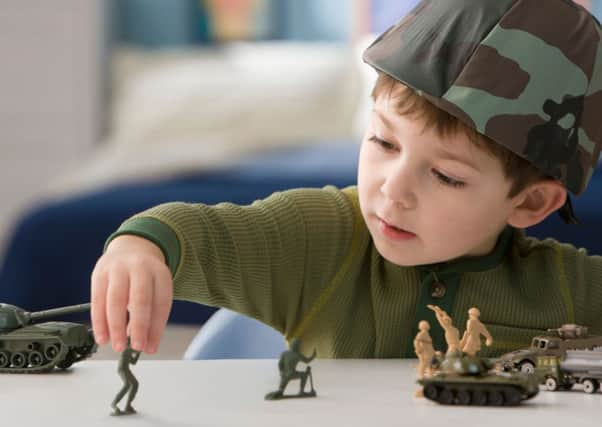Dani Garavelli: Children’s WWI commemorations


THERE have already been so many documentaries about the First World War and so much discussion about the rights and wrongs of the centenary commemorations, it is easy to forget that the 100th anniversary of the assassination of Archduke Franz Ferdinand in Sarajevo isn’t until Saturday and the 100th anniversary of the start of the war isn’t until the end of July.
Indeed, you could look at the last six months’ bombardment – which has seen several fierce skirmishes (Michael Gove’s attack on Blackadder; Australia and New Zealand claiming the role of the Anzacs was being ignored, etc) – as a phoney war, with the event kicking off in earnest this weekend when the centenary of the aforesaid assassination coincides with Armed Forces Day, an annual festival of fly-pasts, parades and simulated combat being held in Stirling.
Advertisement
Hide AdAdvertisement
Hide AdThe anniversary of the assassination is being used as an opportunity to re-examine the enmities and alliances that caused an individual act of violence to spark a global war of attrition. One project run by the University of Kansas will see 25 people adopting the personae of key protagonists, from political leaders to members of the Black Hand Gang, and “live tweeting” the events of the day.
Between now and 2018, there will be a succession of such opportunities for reappraisal as we commemorate the anniversaries of all the landmark campaigns: Jutland, Gallipoli, the Somme, Ypres, and, of course, Armistice Day. What better way to teach the next generation about the conflict, to remind them of the price paid for peace and to keep the Great War in the “national consciousness”?
Unfortunately, academics who have conducted a survey of school teachers say TV overkill means some pupils are already suffering First World War fatigue. The onslaught of programmes from Jeremy Paxman’s Britain’s Great War to the The Crimson Field means they are wearying of images of recruitment posters, trenches and poppies.
The knee-jerk response to claims of early-onset ennui is to suggest that today’s teenagers are mollycoddled brats who care not a whit for the sacrifices of a generation of boys their own age. But there are perfectly valid reasons they might find it difficult to sustain interest in the commemorations. The first is the complexity of the conflict. The Second World War has a straightforward narrative: the rise of fascism, German expansionism, the persecution of Jews. Younger children may identify with city kids packed off to the countryside with their lunch boxes and gas masks, while older ones may be gripped by the fleet of boats which rescued stranded soldiers in Dunkirk, but everyone understands why we went to war and what was at stake if Hitler won.
The factors which led to the First World War, on the other hand, are incomprehensible to most adults, never mind children. You only have to watch the Horrible Histories sketch in which an army commander tries to convince baffled soldiers they must lay down their lives because the murder of an Austrian by a Bosnian in Serbia means Austria will invade Bosnia, Russia will invade Austria and Germany will invade Russia and France, leaving “our friend Belgium” undefended, to see how bewildering it must appear to 21st-century kids. Also, where the Second World War is replete with dramatic events – Dunkirk, Pearl Harbour, the D-Day landings – the First World War is synonymous with grinding misery and relentless killing on the Western Front (though the eventual death toll in the Second World War far exceeded that in the First World War).
On top of this, to children born in the new millennium – children who are taught about JFK in history, not modern studies – it all seems so very long ago. While most families still have access to first-hand accounts of the Second World War (my children’s grandfather tells them about watching a dog-fight in the skies above Angus, their grandmother about being wheeled out in her pram on VE day), the last British First World War veteran Harry Patch died in 2009. Phrases like “going over the top” and “no man’s land” may be in everyday use, but the events that inspired them are passing out of living memory.
However, there may be an even more depressing reason why some young people are indifferent to the commemorations. In its chaos, its lack of a strategy or objective and the sense of futility it invokes, the First World War has more in common with modern conflicts – Iraq, Afghanistan, Syria – than with the Second World War, and these modern conflicts provide this generation with all the apparently senseless slaughter they can cope with. Faced with rolling news reports and graphic images, they don’t need to read Dulce et Decorum Est to be convinced of the brutality or futility of war. As they watch Iraqi cities fall to Isis, radical British Muslims wage jihad, under-tens wielding AK47s, and world leaders apparently powerless – it’s not surprising if remembering the so-called war to end all wars is not their top priority.
I’m not convinced most young people are uninterested in the First World War per se. The flag-bearing and wreath-laying may not engage them, but individual stories of injustice or heroism have a powerful grip on the teenage imagination. Still, if their attention does wane in the face of saturation coverage, we should cut them some slack. It may not be the commemoration of war that wearies them, but war itself. «
Twitter: @DaniGaravelli1